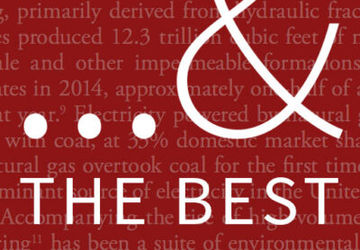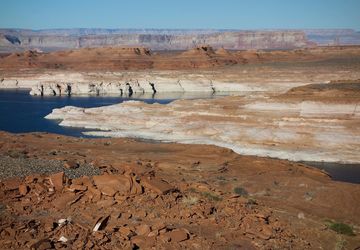On Oct. 22, 23, and 24, Bruce E. Cain, the Charles Louis Ducommun Professor in Humanities and Sciences and the Spence and Cleone Eccles Family Director of the Bill Lane Center for the American West, delivered three talks on climate change as part of the Julian J. Rothbaum Distinguished Lecture in Representative Government series at the University of Oklahoma. With Iris Hui, senior researcher at the Bill Lane Center, Professor Cain conducted a regional poll in August and September of 2019 to determine Californians' opinions on extreme weather events, and on wildfire policy and prevention. In his lectures, Cain drew on the survey findings to help illuminate the politics of adapting to climate change in the American West, synthesizing much of the academic research sponsored by the Bill Lane Center.
The relevance of Cain's topic cannot be overstated; during his lectures, wildfires raged in both Northern and Southern California, and millions of residents were enduring Pacific Gas & Electric's planned power outages, designed to prevent such devastating blazes in the first place. While California has been a leader in limiting greenhouse gas emissions, the fires stand as a reminder to the state that adaptation measures are necessary for developing climate resilience. In the face of frightening climate catastrophe, Professor Cain notes in his lectures that a “window of opportunity” opens for policymakers to consider real changes. How quickly will we learn the lessons from extreme weather to adjust our policies toward climate change? Watch the lectures below to learn more, and find more Stanford research on wildfires here.
About the Rothbaum Lectures
The Julian J. Rothbaum Distinguised Lecture in Representative Government is presented by the Carl Albert Center at the University of Oklahoma every odd-numbered year. Designed as a series of three related lectures, the general theme examines the role of representative institutions in the United States. In addition, the lectures address two principles of major significance to the lecture's namesake, Julian J. Rothbaum: the importance of the relationship between education and public service in a representative democracy, and the importance of participation by private citizens in public affairs.
Watch the Lectures
- Polls indicate that Democrats and Republicans disagree about the causes and policies for dealing with climate change, but the reality is more nuanced. There is a growing consensus throughout the West that droughts and wildfires are more severe. Surprisingly, Texas, Iowa and Oklahoma lead the country in installing wind energy while California struggles with its permitting woes. Voters in blue states refuse to adopt carbon taxes that have been endorsed by prominent Republicans. Is there hope that Americans can get on the same page with respect to dealing with climate change?
- Fires in California and Oklahoma like hurricanes in the East threaten lives and property in highly visible ways. Politicians get more credit for providing aid after the fact than spending money to prevent some not yet realized threat. In theory, catastrophe opens up short windows of opportunity that allow for adaptation steps that otherwise would fail. Can the West take advantage of these opportunities to protect against climate change?
- Some aspects of climate change evolve more slowly and in less dramatic fashion: for example, nuisance flooding on the coasts, droughts and shifting temperature patterns. Without the drama and publicity that comes with catastrophic events, it is even harder to mobilize Western communities to take the steps necessary to handle these kinds of slowly evolving threats. What practices have worked and what lessons have been learned?



